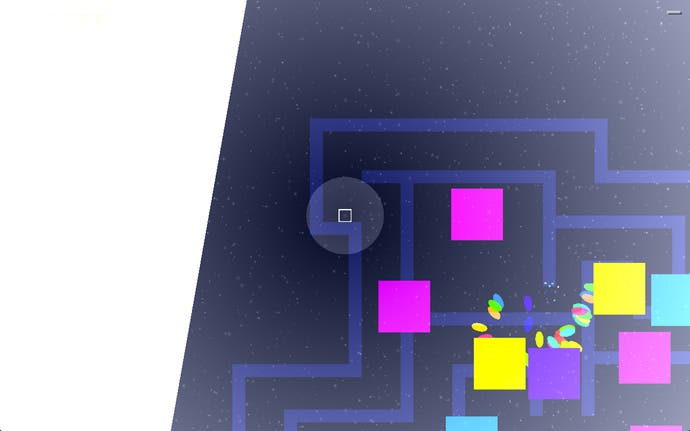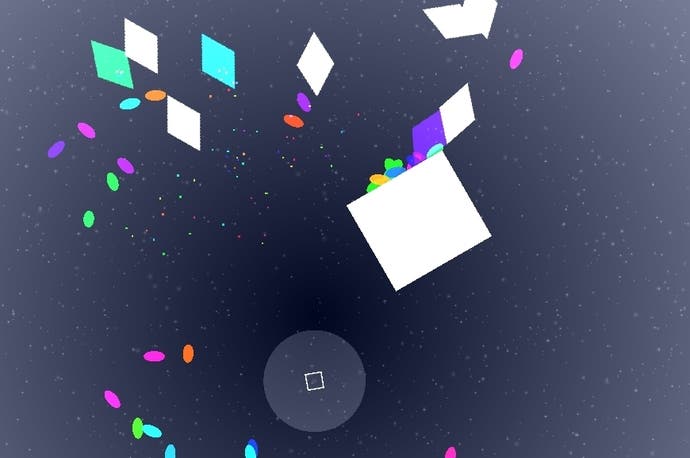David review
Angles and demons.
Great games demand their own vocabulary - a personal vocabulary. David is a case in point.
For once, though, it's not the verbs that require attention, but the nouns. Each level in Fermenter's ingenious boss-rush adventure contains a specific enemy, and each door to each level comes with a compacted one-word title. Those provided are fine, but I tend to ignore them in favour of my own. It makes it easier to remember exactly where each billowing, barreling horror actually lurks.
And so Fathoms is what I call the level where you bob about on the surface of an impenetrable ocean, waiting for a jagged monster to emerge from the depths. Collapse, meanwhile, is the one with the blocked up corridor and the homing missiles, and Jabberwock's the stage where the terrain is mostly open, and a higgledy-piggledy beast bounds towards you the moment you first warp in. The jaws that bite, the claws that catch.
In the face of such gigantic foes, you don't initially seem to have much of a chance. The 2D goliaths you square off against are physics colossi, made from dozens of moving pieces that must be blasted away in order to defeat them. You, by contrast, are a square: four thin lines of light so seemingly weedy that you can sometimes lose track of yourself when the view pulls back to its furthest extent.

It is as it always was, in other words. And yet, as it always was, David is not to be underestimated. You've got a catapult of sorts - a catapult that's charged up by pressing and holding on David until it's ready to go, and then swiping outwards in the direction of your enemy. After that, dozens of dancing points of colour zip across the screen and take chunks out of whatever abstract horror's chasing after you. It's chaotic, but it still feels precise and powerful.
You'll get frantic combat against brutally animalistic assailants here - a proper Euclidean punch-up
The sense of impact alone is really beautiful: there's the screen fade as you charge - accompanied, thankfully, by a slowdown that allows you to steady your aim - and that's closely followed by a perfect little audio chime to tell you you're ready. Then the air's alight with particles and as they make contact your enemy explodes, reforms, and emerges diminished.
There's a cognitive price to pay for this - a lot of David's difficulty stems from the need to switch back and forth between moving (a wonderfully skiddy left and right, and a floaty jump that allows you to basically barrel through the air unmolested) and fighting - but the reward is more than worth it. Even the nastiest of foes can be whittled down in three or four shots, and the pared-back geometrical visuals allow for surprisingly bloodthirsty confrontations. You'll get frantic, pounding combat against brutally animalistic assailants here. You'll get a proper Euclidean punch-up.

On top of that, each of David's bosses insists on throwing in its own gimmicks - and this is where things get really special. Tackle each challenge, and you're effectively having to learn how to play the game all over again. One stage will encase its enemy particles in boxes that have to be knocked out of the way before you can land an attack. Another will extend the platforming, turning the whole thing into a deadly gauntlet and casting the boss as pursuer. The best - and the hardest for my money - sticks you in a tight little maze, while your quarry bombards you from far below. There are nine of these levels at the moment, and at the harder difficulty setting, which gives you a single health point to play with, those nine should be more than enough to keep you busy until the next update.
Beyond the boss-rush onslaught lies unlockables, my favourite of which so far is a kind of survival mode with RPG progression. Starting with a single projectile and almost no health, you're harassed by enemies from all sides, and the wages you earn for seeing them off pay into a simple upgrade system. This turns out to be the perfect compliment to the condensed purity of the main campaign; I'll be checking in with David on a daily basis for the foreseeable future, just to see how long I can last in there.
David's control scheme has clearly been built around the touchscreen, but while the game's a delight on iOS (on iPhone, at least - the buggy iPad version is awaiting a fix at the time of writing), it works surprisingly well on PC and Mac, too. The WASD keys replace the somewhat fiddly virtual controls and the mouse does a decent job of approximating a finger. All versions can rely on the game's abstract terror to keep you playing, though - that and the wonderfully quirky way the narrative is paid out in portentous all-caps sentences that race breathlessly across the screen.
"I hope it feels strangely personal," writes Andrew Armstrong, the game's creator, in the sales blurb for David. It does. It really does. And that, in turn, feels wonderful.

